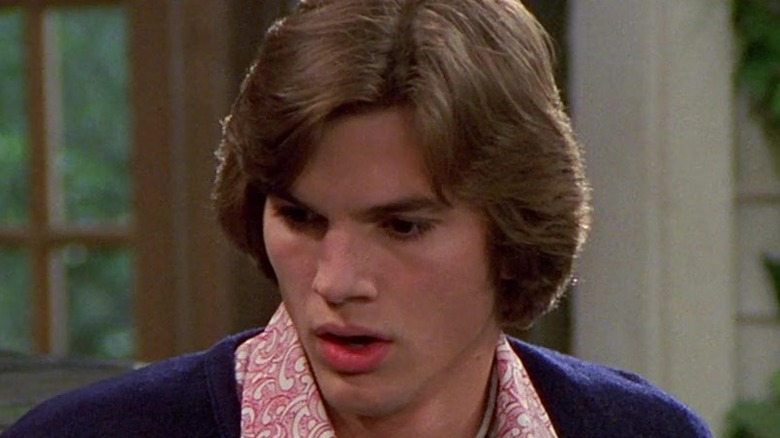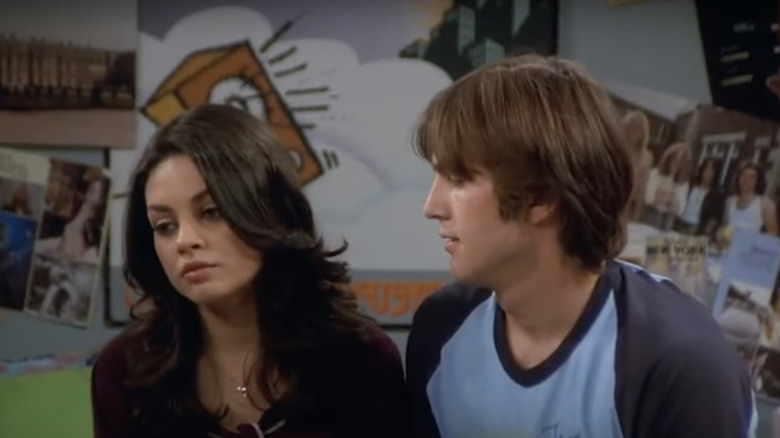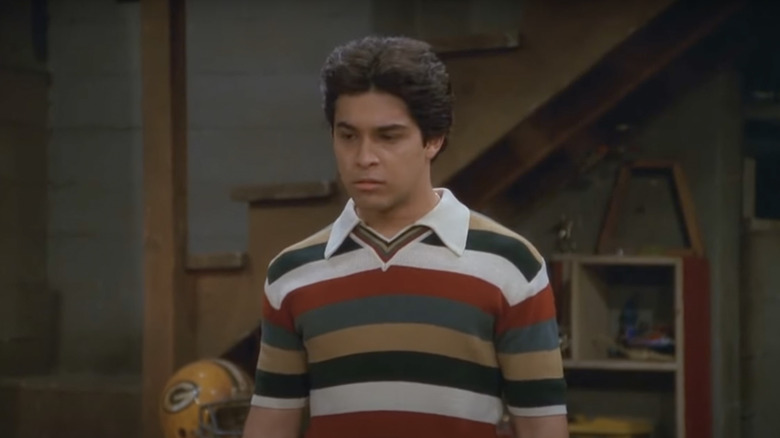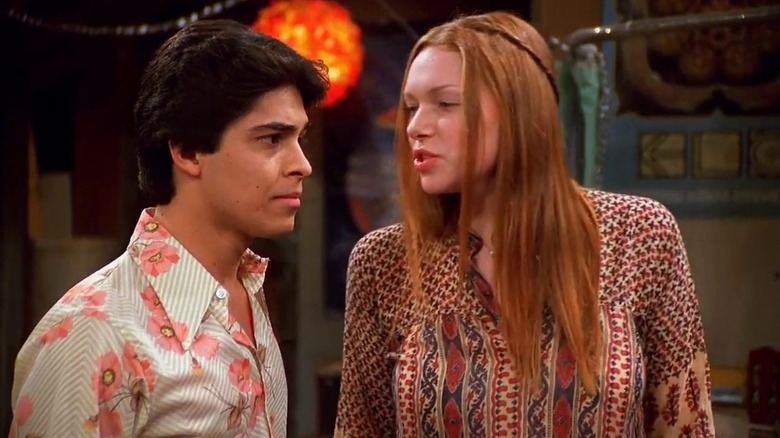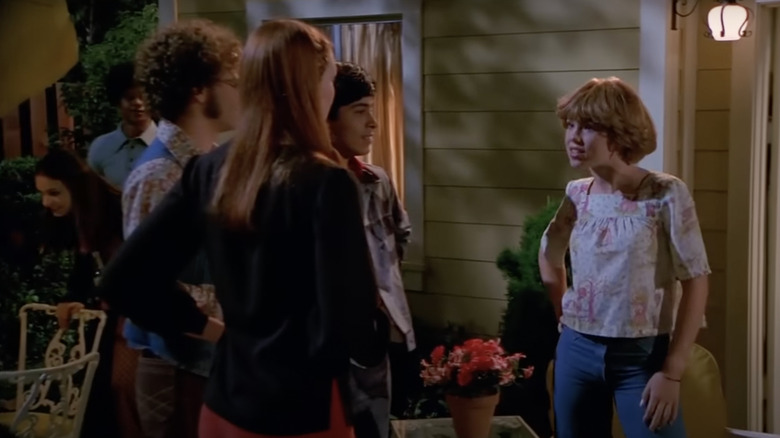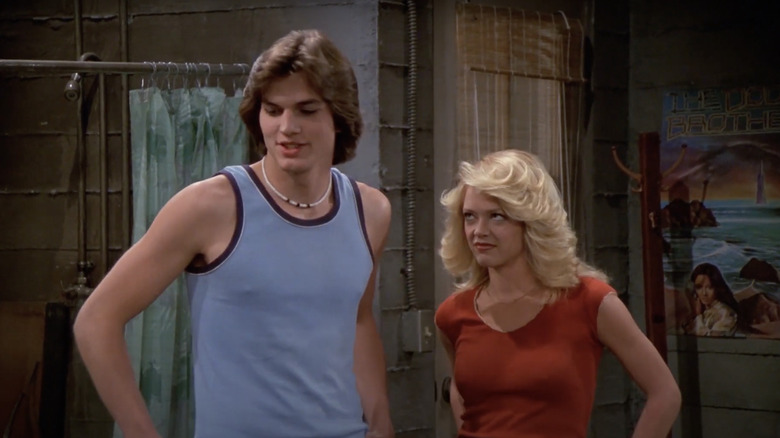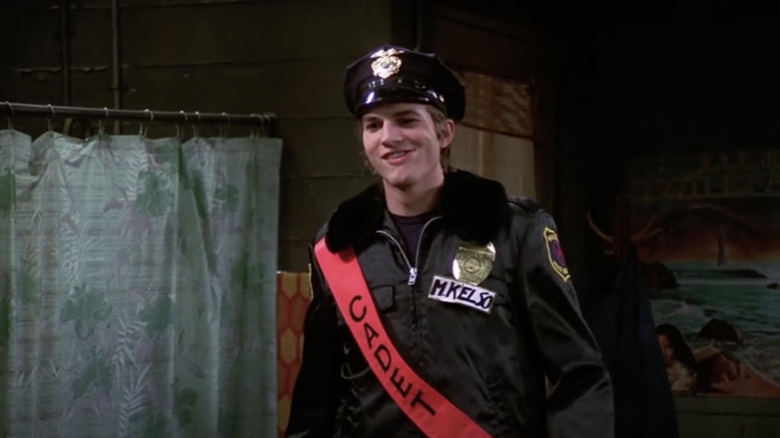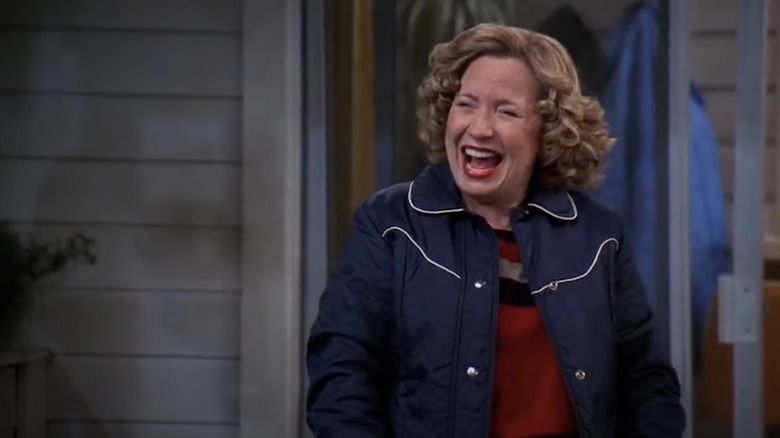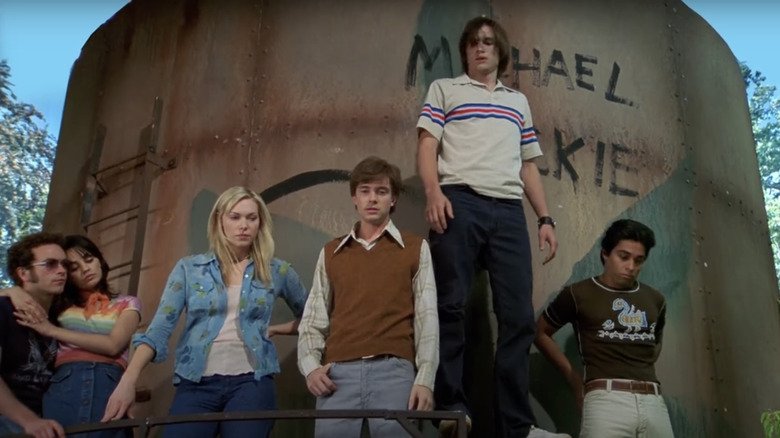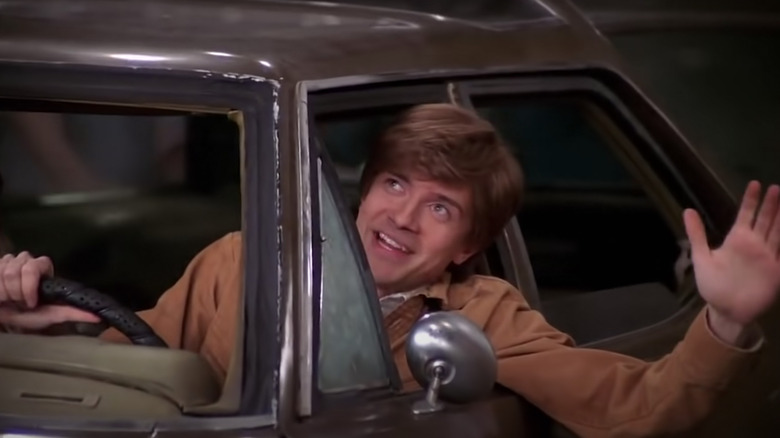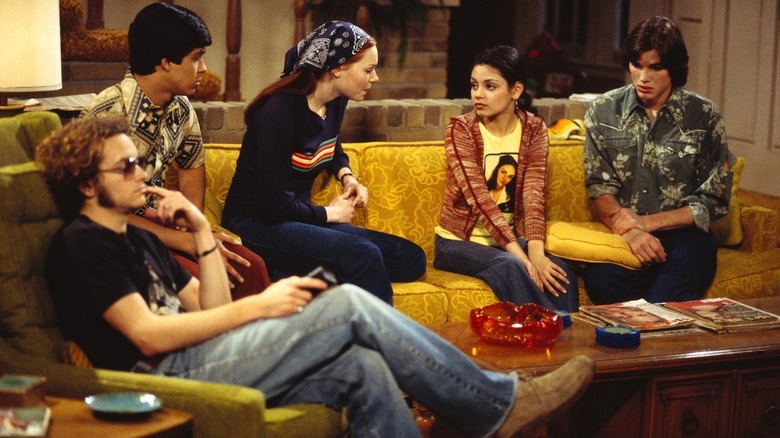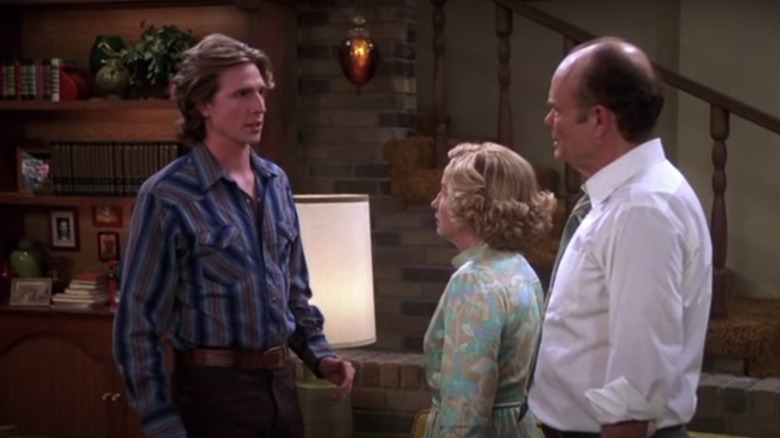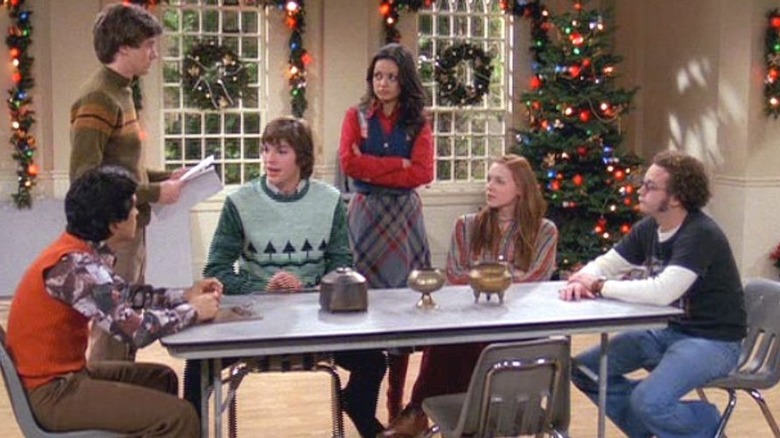Questionable Things We Ignore In That '70s Show
Period pieces like "That '70s Show" are captivating because they have the power to zap the audience back in time. All the same, they don't always get every aspect of a previous era right, and, even when they do, the perspectives borrowed from decades ago don't always age well.
One thing to remember about "That '70s Show" is that the opinions and beliefs of society at large weren't the same in the '70s as they are now, even if the show was written years later. "That '70s Show" ran from 1998 to 2006, but the series itself is suspended in time: It follows six teenage friends in fictional Point Place, Wisconsin from 1976 to 1979.
Although the TV series was undeniably successful to the tune of eight enthralling seasons and helped launch the careers of its young cast –– from Topher Grace to Mila Kunis, Ashton Kutcher to Laura Prepon –– "That '70s Show," like all TV shows, isn't perfect. Here are some of the questionable things audience members tend to ignore when they watch the popular Fox sitcom.
Jackie and Kelso's on-again, off-again relationship
Jackie Burkhart (Mila Kunis) and Michael Kelso (Ashton Kutcher) have, to put it lightly, an exhausting on-again, off-again relationship. Although they don't end up together by the series finale, the couple seemingly break up and get back together on a seasonal basis –– until they, to the pleasure of the audience, finally call it quits for good.
But along the way, the biggest issue with this couple is the fact that Jackie continues to go back to the handsome goofball despite the fact that he constantly proves he can't handle a serious relationship, and on his part, Kelso perpetually leads Jackie on while they are together. Plus, he cheats on her multiple times and constantly complains about her uppity behavior. The fact that he treats Jackie so horribly — and that she is controlling and gets on his nerves to the point where he doesn't even seem to like her most of the time — makes this entire relationship questionable. Why do they draw it out for so long? Who is winning here?
Jackie and Kelso's sparky relationship does provide intrigue to the series for a bit. But in the end, Jackie and Fez (Wilmer Valderrama) end up together, and Kelso finally learns devotion — but as a father, not as a boyfriend. Love doesn't necessarily conquer all in "That '70s Show," but mostly everyone found happiness in one way or another.
Fez is a walking stereotype
Times were different in the '70s. Case in point: It wasn't as frowned upon as it (rightfully) is today to make fun of where people were from. Fez (an nickname deriving from "F.E.S.," the acronym for "foreign exchange student") is an international student who is unfortunately depicted as a walking stereotype throughout "That '70s Show." The other characters don't even bother to learn Fez's real name –– nay, they can't pronounce it, so they start calling him "Fez" instead. His country of origin also isn't revealed. The gang does accept Fez as one of their own, but the fact that they can't even learn his real name is telling.
More troublingly, Fez serves as a catch-all excuse for racist jokes. This character hasn't aged well over the years, and it's not just because the characters around him constantly make fun of him because of his accent, where he's from, and more — the list goes on and on. No, Fez also didn't age well because he'd get eaten alive by the #MeToo movement today.
Fez's sexual transgressions
For "comedic purposes," Fez makes inappropriate jokes and passes at women far too often. Now, again, this is a period piece that tries to incorporate the thoughts, viewpoints, and opinions of the '70s. Yet Fez's behavior toward women is almost always borderline toxic, and his friends just accept this. The audience is expected to as well. Period piece or not, the show's creators thought his behavior would be funny when they wrote it from 1998 to 2006, but in reality it's more creepy than humorous.
Fez even makes passes at/inappropriate "jokes" toward his friends' girlfriends — not to mention the fact that he spends an entire evening in Donna Pinciotti's (Laura Prepon) closet where he, most likely, watches Donna and Eric Forman (Topher Grace) get intimate. Fez is a teenager going through many changes, as all teenagers do, but his genuinely concerning sexual transgressions are written off as jokes. They even feed frequently into the "walking stereotype" portrayal, encouraging a problematic association of creepiness with individuals from foreign countries. No one, especially in a TV show, is perfect, but Fez crosses the line many times.
Disappearing siblings
The most obvious disappearing sibling act in "That '70s Show" is Eric's sister, Laurie (Lisa Robin Kelly). Although Laurie isn't in every episode, she does play a big role for a majority of the series' earlier seasons. Actor Lisa Robin Kelly played Laurie in Seasons 1 through 3 (and the character appeared again in Season 5), but she was replaced by actor Christina Moore in Season 6. This is because Kelly dealt with substance abuse problems and had to be written off the show, with the exception of her brief Season 5 return. And even after Moore replaced her, Laurie only appeared in Season 6 before the character was written off once again.
A less obvious character disappearing act is the vanishing of Donna's siblings. In the early episodes, it's mentioned that Donna has two sisters who no longer live at home with the Pinciottis. While audience members never get to see Valerie, as she's only referred to, Tina makes an appearance in the episode "Eric's Burger Job." From that point on, however, Donna is referred to as an only child. This is odd, especially considering Tina is Donna's younger sister, so you'd think that since Donna is a minor who still lives at home, so would Tina. In fact, the Season 2 episode "Vanstock" humorously poses the question of what happened to her.
The way That '70s Show treats Laurie
Although Laurie is beloved and treated like a perfect child by her father, Red Forman (Kurtwood Smith), the rest of the gang shames her. They're never afraid to point out how many partners she's had, and the show –– as indicative as ever of the times –– clearly judges her character because she's still single at a certain age and seemingly directionless in life.
Laurie is painted as a bad person because of her sexual explorations, which is, of course, a double standard: The group's young men ostensibly search for women to bed on a routine basis. The scene in the episode "Red's Last Day" in which Laurie has non-consensual sex with Kelso is certainly disturbing, but truly, her character was doomed long before that inappropriate act. She also constantly manipulates her little brother Eric, and Red blindly takes her side. But none of that excuses (or has anything to do with) Laurie being treated like an outcast because of her sexual explorations. That treatment is unfair no matter what, and it doesn't hold up well at all to more discerning audiences today.
Kelso becomes a cop
Kelso, who is no stranger to partaking in illegal activities on a regular basis, eventually becomes a police officer. Everyone deserves a shot at their dreams, but Kelso becoming a cop is one of the more far-fetched (and out-of-character) events in the series. After all, look who we're talking about here. Would you want Kelso (the character, not Ashton Kutcher) to enforce the law in your town?
But Kelso continues to follow his dreams, however unlikely they are, and along the way he accidentally burns down the police academy with a flare gun. What better proof that he's not adequate for the force? But against all odds, even after firing multiple flares inside the academy, Kelso becomes a police officer. No one is perfect, but Kelso pursuing a career as a cop just doesn't make sense: Becoming a law enforcement officer because you have nothing better to do is a terrible idea, not to mention unsafe for civilians. But order is restored when Kelso is finally kicked off the force ... only to become a security guard.
The running joke about Kitty going through menopause
Kitty Forman (Debra Jo Rupp) is, without a doubt, one of the most kindhearted and loving characters in "That '70s Show." Not only is her laugh contagious, but she truly cares about everyone. She is, in a way, the neighborhood's mother — and she certainly deserves better than when the show makes her menopause a running joke. Not only that, but when Kitty is stressed out about life, her family, or the changes she's going through, she'll turn to alcohol — and this habit is problematically depicted as a running gag in the series, too.
Poor Kitty goes through a lot emotionally and physically on a near-daily basis, and no one really cares. It seems like a cruel way to treat the nicest person in the entire series: Menopause is undeniably a difficult time for Kitty, yet the people she cares for most just make a mockery of it. They also don't try to help her, even when she begins drinking more.
All that said, it's amazing that Kitty is able to (mostly) keep her cool while going through all this and living in the same house as Red, Eric, and Steven Hyde (Danny Masterson). Hyde has no manners whatsoever, Eric is one of the most selfish people on the show, and Red, well, he's a ticking time bomb waiting to go off. But Kitty cares for them all selflessly while dealing with plenty of her own stress.
The water tower injuries (or lack thereof)
Although the water tower isn't as popular of a hangout spot as Eric's basement, many "cherished" moments are shared at this destination. Most of those moments consist of people falling off the tower (we're looking at you, Kelso), which, in the real world, would lead to serious, possibly fatal injuries. But since this is a sitcom, these dangerous mishaps are supposed to be viewed as jokes instead. Because nothing is funnier than someone falling off a water tower, apparently?
"That '70s Show" is sprinkled with TV magic, and as a result, the characters in these situations typically receive minor injuries. Even still, with at least one broken arm injury and all of the likely hospital visits, one would think the town would do something to make the water tower safer. Ideas include fixing the rail that routinely breaks off or somehow making it more difficult for teenagers to climb to the top. Or maybe a police officer could patrol the area, especially since the tower has been vandalized before. Realistically, both the injuries from the water tower incidents and the authorities' response to them would be much more serious outside the world of television.
Eric moves to Africa
Off-screen occurrences (such as Topher Grace leaving "That '70s Show") tend to affect production, whether for better or for worse. In Season 7, Eric decided he wanted to be a teacher, just as Grace the actor decided he wanted to prioritize starring in movies. Eric couldn't possibly become a teacher in Point Place, Wisconsin: His friends would surely still want to hang out, and it wouldn't make sense for him to stop being a series regular. So the writers decided to make him a teacher in Africa, a transition that also allowed Eric to return if Grace desired (which he did for the series finale). The Africa storyline was meant to be a natural way of cutting Eric out of the final season.
The writers of the show, of course, had to do something about Grace's departure, but moving Eric to Africa seems a bit excessive — especially considering the series takes place in Point Place, Wisconsin. It doesn't make a lot of sense for the inhibited Eric to suddenly move from the rural Midwest to the other side of the world. With that said, audience members should be happy for him: His trip is fully funded, meaning Red doesn't have to pay for it, and Eric is finally doing something truly meaningful. It all works out for him in the end, but we must admit that an Eric-less Season 8 is a less-than-desirable conclusion to a show that previously revolved around him.
The constant use of Red's basement (even after Eric is gone)
Although Red is rightfully a fan favorite, he can also be pretty strict, which makes the constant use of the basement in his home a bit of a head-scratcher. After all, Eric and his friends are seemingly always hanging out in the basement, eating popsicles, avoiding responsibility, and regularly using an illicit substance. Red isn't the type of person who likes handouts, and his family also goes through financial troubles throughout the show — so although it might sound like picking nits, surely Red wouldn't allow the neighborhood kids to eat their family's food and run up his electricity bill. And surely he would've banned basement hangouts after finding out about "the circle." The illegal substance in question, for what it's worth, also has a distinct smell.
All that aside, it's even stranger that Red and Kitty's basement remains a popular hangout spot even after Eric moves to Africa. It's hard to believe that Red would allow Eric's friends to hang out in his basement when all of his own kids have finally left the nest. But the show must go on, and this was one of its most popular settings.
Everything wrong with Season 8
Sometimes, people have to make do with what they have. It's not fair to entirely blame the creators for the final chapter of "That '70s Show" jumping the shark. Neither Eric nor Kelso were major parts of the season; Eric didn't even appear until the series finale. These absences, along with many other factors, inspired numerous complaints about the eighth season. For one thing, justifiably or not, audience members weren't fond of Randy Pearson (Josh Meyers), Eric's replacement.
In Randy's defense, he has to come into an already established friend group and take over for some of the most beloved characters (first Eric and eventually Kelso). A better option (hindsight is 20/20) might have been for the creators to further develop the remaining characters. Instead, they stick the awkward Randy into the friend group and have him take over Eric and Kelso's roles — Randy and Donna even develop a forced relationship. From the beginning, his character faces a losing battle for acceptance.
Okay, enough picking on Randy. Another source of frustration among fans is that Fez and Jackie end up together, undoing Jackie and Hyde's entire relationship as well as undermining the individual character development they experienced because of it. These are just some of the reasons audience members weren't pleased with the final season. We can still enjoy it, but we have to ignore a lot.
The show's timeline and continuity issues
Suffice to say, the timeline of "That '70s Show" is a tad confusing. The show's story begins in 1976, and although the series ran for eight years in real life, the storyline itself ended seconds before 1980. And although these episodes were welcomed, the show aired a Christmas special in almost every season, which definitely adds up to more than four years. Then again, the characters and their fans get to celebrate more holidays, so it's not all bad.
The show is about the '70s, so it's only natural to keep the series stuck in that decade — though maybe the writers should have committed harder when it came to continuity. Still, timing the finale with the coming of the '80s is a neat way to send the show off in style, especially after a less-than-stellar final season: It makes us hopeful for new beginnings. The show's timeline is definitely a questionable element, but it's luckily easier to ignore than some of the more glaring issues. Who's really going to complain about extra Christmases?
Despite any realizations we may come to and subsequently be forced to ignore, "That '70s Show" was a beloved series in its time, and there's still a lot to love about it today. If nothing else, it offers pleasant entertainment, cherished characters, and countless laughs.
